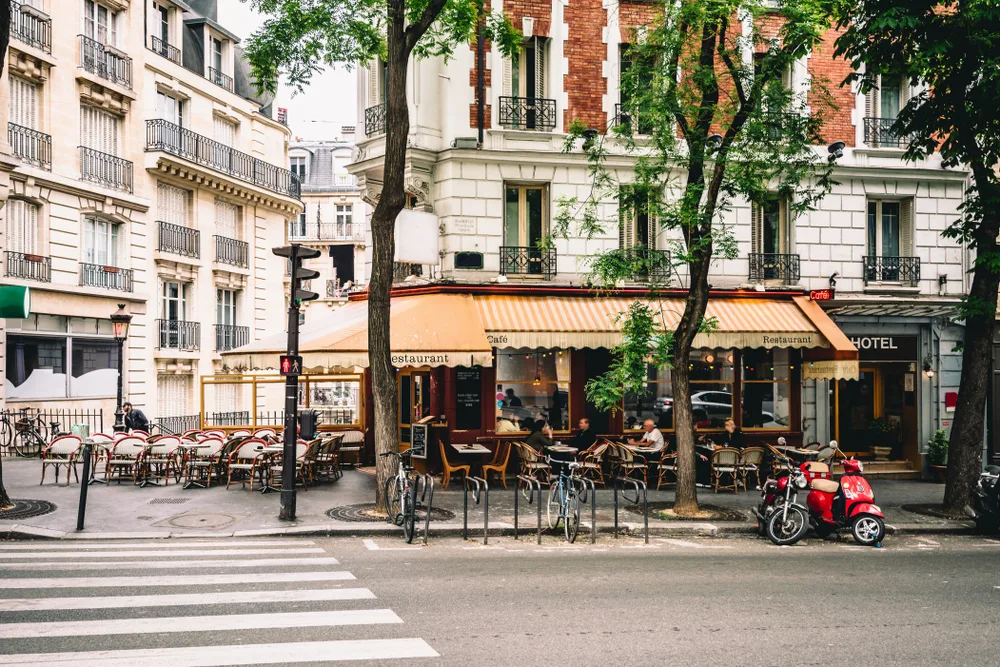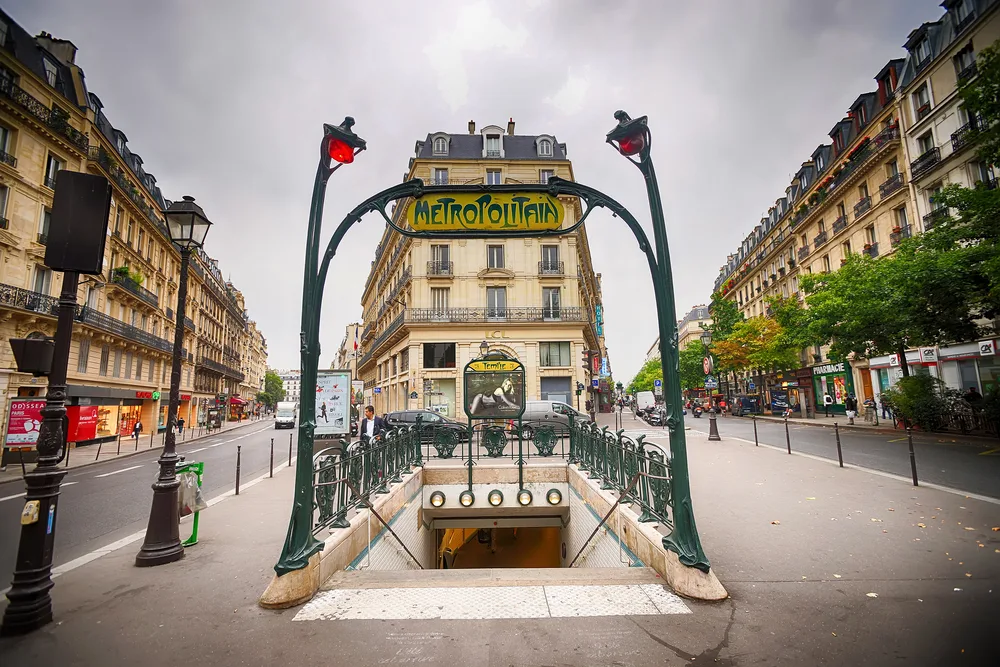Paris, the City of Love, is one of the world’s most popular tourist destinations. Every year, about 44 million people visit Paris, making it the most visited city in the world.
Paris is home to some of the world’s most recognizable landmarks, such as the Eiffel Tower and the Arc de Triomphe. The city is an art lover and history lover’s dream, with stunning museums such as the Louvre, the Musée d’Orsay, and the Palace of Versailles on the outskirts.
Of course, no trip to the fashion and gastronomy capital of the world would be complete without some shopping (at least window shopping), dining in great restaurants, and sitting on iconic café terraces.
This city is a wonderful tourist destination, but remember that it’s still a major metropolis with about 11,000,000 people in the entire metro area.
That means it probably has some of the problems that plague big cities around the world. So, is Paris safe to visit? Here’s our expert take.
Is Paris Safe to Visit in 2025?

Catarina Belova/Shutterstock
Yes. Paris is mostly a safe city to visit, but you’ll definitely want to be on your guard. The city has a notoriously high rate of petty theft, especially pickpocketing.
It also faces some other challenges, such as civil unrest and occasional terrorist attacks, but you can mostly avoid those by taking a few basic precautions.
Most countries have a Level Two travel advisory for France, especially for Paris. For example, the United States advises its citizens to exercise increased caution in all of France due to the risk of terrorism, civil unrest, and higher crime rates.
Since Paris is the French capital, it is the most likely target for all of these problems. Like any big city, Paris has crime.
The most common criminal incidents affecting tourists to Paris are:
- Phone theft
- Pickpocketing
- Bag snatching
- Tourist scams
- Mugging
- Robbery
- Assault
Although crime can affect you as a tourist, it’s important to keep a few things in mind. For every tourist who is the victim of a crime in Paris, there are dozens, if not hundreds, of others who have only a positive experience in the city.
Plus, most crime incidents that affect tourists in Paris are non-violent incidents of petty theft.
Paris has other problems besides crime. France is notorious for its frequent demonstrations, and since Paris is the capital, the largest demonstrations are usually concentrated in Paris.
For example, in early 2023, Paris was paralyzed by frequent marches and strikes protesting the pension reform that many people saw as imposed upon them by President Macron.
Since late June 2023, Paris and other French cities have seen waves of residents protesting the police shooting of a 17-year-old boy of Algerian descent in Nanterre, a Parisian suburb.
Many of the protests have turned violent as people expressed their anger over what they saw as France’s long-standing policies discriminating and segregating the country’s African, Arab, and immigrant populations.
Many travelers were worried about the protests and thinking about changing their plans. Demonstrations in Paris sometimes turn violent, with now-notorious clashes between protesters and the police.
Even when they are not violent, demonstrations are still disruptive as they often accompany strikes, which paralyze important services such as Paris’s public transportation or even airports. Follow local news for updates before and during your trip to see if you may need to adjust your travel plans.
The good news is that Paris is a very big city, and you can have a wonderful vacation there, even during demonstrations. Read up on demonstration routes ahead of time and spend time in neighborhoods that are away from the noise.
Be a bit flexible, account for extra time to get where you need to go, and take it all with the knowledge that you are experiencing a part of French culture that is as authentic as croissants.
On a less lighthearted note, many countries advise travelers to be cautious when visiting France due to terrorism.
Paris has been targeted by these attacks in the past, such as the November 2015 attacks on the Bataclan concert hall and other locations in Paris that killed 130 people in total. Responsibility for the attack was claimed by ISIS.
French authorities and Paris police greatly stepped up their anti-terrorism efforts after that shocking event, and there have been no terrorist attacks of the same magnitude since.
However, there have still been terrorist incidents, such as a knife attack in the Gare du Nord train station in January 2023 and a shooting by a far-right terrorist at a Kurdish cultural center in December 2022 that killed three people.
While it is unlikely that you will be the victim of a terrorist attack in Paris, the risk is still there. The risk is higher in crowded areas, around government buildings, and near transportation hubs. If you are in a crowd, always have an exit route in mind.
Obey the orders of authorities, especially if they warn that a terrorist attack may happen. Avoid areas where there has been an attack in case there are copycat follow-ups. With all these dangers, you may wonder why so many people visit Paris at all!
However, we are just telling you the risks that might happen when you are in the city so you can prepare, not what will definitely happen. As long as you take the right precautions, you’re likely to have a safe trip.
Ready to Book?
Unlock Exclusive Discounts on Expedia.com!
Got Travel Insurance?
Protect yourself for unexpected interruptions.
Compare Plans We may be compensated when you book after clicking on one of our links.Crime in Paris

Catarina Belova/Shutterstock
Like any big city, Paris has its fair share of crime. Although terrorism and civil unrest grab the headlines, crime is the problem that visitors are most likely to experience.
According to Numbeo, which collects survey data on crime, most locals are concerned about the level of crime in Paris. Paris scores 61.55 out of 100 on the crime index, which is a high value.
People are most concerned about verbal harassment in public, widespread drug abuse, and especially petty theft. Keep in mind that surveys are based on people’s perceptions, not hard numbers, so take this information on board with that in mind.
According to French police, in 2022, some crimes fell while others rose to worrying heights. Violent thefts fell by 25% in the center of town. Other crimes increased, such as burglaries by 5.3% in the center.
The police warned that even the drop in crime was not cause to be optimistic because crime in the Paris region was still very high.
However, before you start thinking about Paris as a crime-ridden city, it’s important to know a few things that complicate the picture. Paris may have a high rate of crime, but the vast majority of those crimes are petty thefts.
Most travel advisories mention that the center of Paris has a very low violent crime rate — far lower than many cities in the U.S. Plus, most crime statistics for Paris include the entire metropolitan area.
Crime rates in Paris are driven up by the suburbs.
These are often highly impoverished, de facto segregated areas with high crime rates (you’ll notice that most news reports about crime will mention different crime rates for the city center and the suburbs). Crime happens in the center as well but at a much lower rate.
Petty Theft
The most likely crime you might experience in Paris is petty theft. Petty theft of all kinds, including phone snatching, bag snatching, pickpocketing, and scams, abound in the city.
According to the Canadian travel advisory for France, petty theft is common in Paris. Thieves operate around major tourist sites such as Montmartre and the Eiffel Tower and on public transportation such as the Metro and RER trains.
The UK government recommends precautions for preventing theft. If you have a bag, opt for a cross-shoulder bag instead of a shoulder bag, as it is harder to snatch. Divide your valuables so that if your bag gets stolen, you still have money to get home.
Always keep your belongings close to you. Locals recommend never hanging your bag off the back of your chair and always looping the strap around your foot if you put it on the ground.
Be especially careful on the metro. Avoid standing near the doors, as thieves can snatch your valuables and leave in seconds. Locals advise visitors not to use their phones on the metro as phone thefts are very common.
Tourist scams are common, so be alert if someone seems intent on distracting you.
The bracelet scam is one of the most common scams. Someone will offer you a free bracelet, sometimes forcing you to take it, then demand payment. Never stop to interact with bracelet sellers.
Robbery
Violent robberies have sometimes happened in Paris. The Australian government warns that groups of robbers often target tourists.
Common locations for robberies include the trains from the airport, transportation hubs such as Gare du Nord, and certain Paris districts such as the Latin Quarter.
Almost all robberies and violent attacks happen at night, so make sure you are not wandering around alone very late. Take a taxi instead of public transportation.
If you are out at night, stick to well-lit, well-trafficked main streets and avoid behavior that makes you a target, such as being too drunk or using an ATM.
Avoiding Bad Areas

PARIS – SEPTEMBER 05, 2014: Paris Metropolitain entrance. The Paris Metro or Metropolitain is a rapid transit system in the Paris Metropolitan Area/Sorbis/Shutterstock
Most bad areas in Paris are far away from the city center in places where tourists rarely venture. This includes neighborhoods such as Clichy-sous-Bois, Nanterre, and Bobigny.
There are some areas in the center that have higher crime rates. Pigalle, near Montmartre, is one of the most notorious but is a safe, multicultural area to explore during the day.
At night, the areas around transportation hubs such as Gare du Nord, Gare de l’Est, and the massive metro station Châtelet–Les Halles can get sketchy. You may want to travel by taxi instead.
Frequently Asked Questions

Ansharphoto/Shutterstock
Here are some common questions people ask about Paris:
Is it safe to walk in Paris at night?
Walking in Paris at night is only safe if you take the right precautions. Don’t walk alone — stick with a group if possible. Only walk in well-lit areas with plenty of other pedestrians. An evening stroll just after dark in Paris is lovely, but don’t go walking around very late at night or early in the morning.
What is the safest place in Paris?
The very central neighborhoods and upscale areas of Paris, such as the Marais, are usually safe. Just be careful around tourist attractions, as those tend to attract pickpockets.
Is Paris safe to walk around alone?
Paris attracts many solo travelers who walk around alone. However, your safety depends on the time of day. During the day, Paris is very safe, but you may feel unsafe at night.
How can I be a safe tourist in Paris?
Basic street smarts can help you stay safe. Never leave your valuables unattended, spread your money out, and don’t stand out from the crowd with expensive items.
Is four days enough for Paris?
Most people say a lifetime isn’t enough to get to know Paris. However, to see the highlights and get a feeling for how locals live, four days is good enough.
So, Is Paris Safe to Visit?
Is Paris safe to visit? We think so, but it’s not without its challenges. The good news is that as long as you do your research ahead of time and take the common-sense precautions you would expect when traveling to any big city, you can join the millions of happy travelers who visit Paris each year.
So, with so much to see and do and a relatively safe atmosphere, what are you waiting for — book your trip today and experience for yourself all that this idyllic city has to offer!






